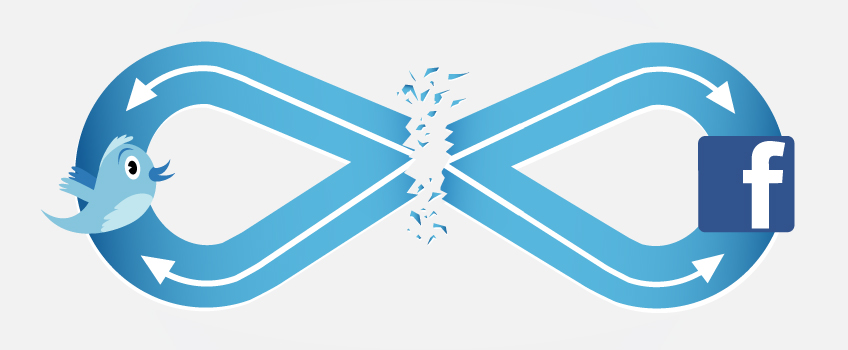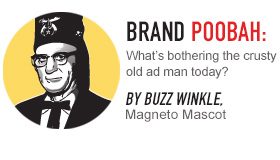We all have those Facebook friends that have constant status changes every time they send a tweet because of those obnoxious automatic updates. Fine, I get it, you figure you are going to say the same thing in both Facebook and Twitter, so why not lessen the workload and have one post to the other automatically. This is fine for your friend (I guess). However, when it comes to brands – the rules change. Facebook and Twitter both have their own special uses and benefits. It is critical that companies use them separately – and for multiple reasons. Here are 5 reasons why brands should NOT link their Facebook and Twitter accounts:
1) Their uses are different. Facebook can be used to generate conversation, ask open-ended questions, run contests, share videos and photos, promote events, etc. Where as Twitter should be used slightly different and more intimately. Twitter can be used for customer service, conducting contests, connecting with other companies and partners, gathering market intelligence, giving real-time updates, etc. The experiences are different. I once read that “Facebook is like a reunion of friends and Twitter is like a podium in front of an audience with a short attention span.” This is critical when delivering your messaging through these platforms. Understand that Facebook users are there on different terms than Twitter followers. Give them the information in a manner appropriate for each forum.
2) Audience expectations. Twitter was designed with the intention that it would be accessed and used most on mobile devices. With this in mind, there is a 140 character limit to your updates and Twitter users expect tweets to remain within that limit. When you post your Facebook status to your Twitter page and you go beyond the 140 character limit – you have lost the attention of your Twitter Follower and have probably annoyed them. On the other hand, if your Twitter posts are automatically posting to your Facebook page, by the time you retweet a couple of tweets and add in your own posts – suddenly you have posted six different statuses on Facebook in a matter of hours. That is too much. Your Facebook audience will not like this, it is not what they expect.
3) Language barriers. There is a different language spoken on Twitter as there is on Facebook. When you have the two updates connected, your Facebook statuses might not even make sense to your friends if there are “@’s” and “RT’s” in the type. This often annoys and confuses Facebook audiences. And if you are posting from Facebook to Twitter, with more than 140 characters – again, you are not following the language rules. The link that Twitter provides in these circumstances just becomes an extra two or three steps. Twitter users want to follow those that speak the language, not those that require extra steps to read every tweet.
4) Missing out on opportunities. When you only post to one page, you are missing out on the specific benefits of the other. If you only post through Facebook, do you know if people are talking about your brand or trying to interact with you on Twitter? No, you don’t. If you only post through Twitter, do you respond to comments on Facebook or do you add content like pictures and videos? Most likely, no. These are key components of both Twitter and Facebook that you don’t want to ignore. Keep your communities separate, learn them thoroughly, have a personality and take advantage of the benefits that each forum has to offer.
5) Duplicating info. Even your most loyal customers and fans do not want to see the same information twice. If the information is not different from one to another, why would your customers need to pay attention to both forums? You always want to keep your content fresh. Keeping both forums separate, will alleviate this problem. There will be some circumstances where you will want to give the same information to both audiences – this can be done, just do it right. Keep your Twitter post within the Twitter language, do the same on Facebook and you should have no complaints.
Share:
Recent Posts
- 9/22/2016 • Magneto Creates M Financial’s 2015 Annual Report
- 8/03/2016 • Magneto aligns Marger Johnson’s look with the industries it serves
- 7/20/2016 • Magneto brings bold vision to City Color branding and website development
- 7/13/2016 • Brand Advertising, Defined: The Creative Process
- 5/25/2016 • Brand Advertising, Defined: Where Science Meets Art



